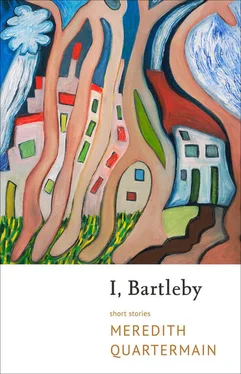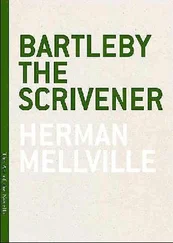Which one is prettier? The blonde with perfectly straight dustily gleaming hair swinging over her shoulders? Or the dark with wavy locks beaming away from her face like chocolate rays from a smiling sun? Oh — they are so ripe he could just pluck these bloom-covered plums. The elegance of the blonde with her long lashes and classy lipstick the colour of coho salmon and harvest moon. Then the laughing good-heartedness of the dark with her bright red smile from ear to ear — the way she tosses her head back and giggles and leans over to her friend. To discuss what else but him.
Surely they’re eyeing the curve of his pencil moustache arcing out across his cheek. The way he’d cut it to slink round under his jaw and, sharp as an etching, curl up over his chin, tracing two little circles below his lips. Do they know what he’s thinking? Of course they do — the way they laugh and lean over their glasses of Cabernet Franc. Which one likes him more? The blonde is a little cool, a little reserved — that’s the way with elegant people — that’s the style of elegance that doesn’t wear its heart on its sleeve — that doesn’t even bother with sleeves or what it’s got simmering beneath its beautiful surface. The dark asks him how his day’s going. She keeps asking even after he’s taken their order if his day is going better, now that she and her friend are here. Oh, much better. How much? Way ahead. Did you upgrade from a one to a ten or a one to a hundred? So precise — are you in statistics? She does market surveys. No, I don’t.
The chefs have a concert of plates steaming on the bar. The maître d’, a puff-cheeked wind about to blow an arctic gale, glares at the waiter, who sails over to the plates and ferries them out, three to an arm, to his guests. He’s jovial with the professor and his younger companion. Prudent with the skinhead and his business partner. Courtly to their French-rolled wives, after he almost delivers their bread and duck pâté to the solitary patron with a stein of beer. Mercurial, ardent, soothing, discreet, and inspirational — he’s buoyant with grins and tact. His guests, too, play their parts. They even win awards — best supporting partner, best costume design, longest monologue, most dithering over Malbec or Merlot, most desperately trying to be interested male in conversation with female. And the waiter, too, with his gladsome clairvoyance, his jaunty judiciousness and astonished alertability, must be awarded a prize — of best director.
that peculiar tangle one gets into as a hostess with a guest with whom she can’t quite find the spark of animated talk. A cloud of expectation of jovial or intense speech hanging between them, making her forget even the basics of How to Win Friends and Influence People , and fall instead into a certainty of her own complete neanderthalness — cave hostess stumbling toward signs painted on rock — guests needing more wine, martini olives too stale, fish raw or overcooked if she doesn’t pop it out of the oven again and check.
A spore — who scattered it? — roots in the consciousness of Mme hostess and Mme guest, a fungus spreading rhizomatic filaments through the hillsides of their forests. Mme hostess senses Mme guest’s reticence and Mme guest senses Mme hostess’s sensing of this uncommunicativeness, Mme hostess in turn sensing that Mme guest senses how effortfully Mme hostess is stumbling in her cave toward Mme guest, that her talk is not natural , that word so beloved by manufacturers of highly processed food. The talk is obstinate. The talk is not spontaneous. Not sprung like combustion of oxygen and carbon, but ground like the slow rub of tectonic plates.
A hostess should know exactly how to ignite an uplifting flow of news and ideas, and Mme guest is embarrassed for Mme hostess’s inability to raise Mme guest from her ennui and disengagement, her dulled drifting in the buzzing room, embarrassed for Mme hostess’s encumbering hesitancy, but also for her own cat-got-her-tongueness, which has created now a kind of anti-ignition of two glowing logs who instead of sparking each other into flame douse each other into nullity with suspicions that either one or the other is boring or bored, that the enthusiasm of party inquiries is provincial, that one wearing the same clothes year after year while the other always sports something new has unleashed irreparably The Fear of Not Being Loved (Mme hostess will later think of the time when we were all guests of mothers who may well have been taken aback at the brazenness of beachheads in their most intimate rooms).
The fear that makes one not speak. Mme hostess could muster a little effort toward a silent body wrapped in its circuitry of cellular impulses, but she falls away, a burnt log, afraid to step into the darkness of that circuitry, afraid to blithely utter such a common thing as a word, only to find it yawn to a black hole where she will shrink to an infinitesimally tiny dust mote. Would you like to try some of my tapenade? she says to Mme guest, I made it myself.
to write by hand, drawing the tail of one letter into the stroke of the next. Cursively running like a stream through a valley it’s worn away for millennia. The stream’s feet carry its lazy or swirling surface — thousands of hands hold it above heads of all those jogging legs, the letters and words. Can medieval monks be said to have practised handwriting? Or was it rather a form of calligraphic printing? Letter by letter stop and go. Broad tips of their quills fattening and narrowing around the curve of an o, a, c , or b . Leaping away to pick up ink. Returning to page to strike boldly down the stem of a t . Then jutting sharply to cross the t — the cross they’d committed their lives to or perhaps were driven to by cold nights and empty stomachs.
Australian aboriginals scripted fields of coloured dots with ropes of song to carry their world. Chinese and Egyptians wrote in pictures — a man or a sun or a house stepping out of brush strokes or gouges of stylus. Nowadays we don’t write with hands and arms, we write with fingers or thumbs. We don’t sweep around curves, jut up risers, or swoop down descenders, curling and uncurling a c or an s , looping and knitting our letters. Nowadays our neurons manage rows of on-off switches, fingers wired to three or four buttons commanded by imagined letters, the conveyancers of thought, printed in our brains. Except for lists of milk, bread, and apples. Or receipts handed out by someone taking away a rug to clean. Or the cramped script on tiny lines of dental records using the universal tooth numbering system: watch 7; replaced amalgam in 12 and 29; scaling, two units; recommended extracting 32.
Then, too, when you are seventeen or eighteen or even nineteen and starting your first job as a clerk in a dental office and there are doors to cupboards containing cottons and gauzes and sterilizers and stainless steel instruments, trays and masks and anaesthetic, and pieces of equipment you don’t know about yet, there’s not much you can do. The others don’t have time to tell you and even if they did you can’t remember it all — it’s hard enough with names — Dr. B___? B___? B___? Brandlehand. Doctor with sideburns beginning with F or S — his door always shut. Don’t go in if there’s a patient. There’s not much you can do in the mumble of hygienists and patients, the whir of drills and tiny hydraulic jackhammers chipping tartar away from tooth enamel. Doctors breeze from chair to chair. Patients drift up to the clerk’s desk, resting their elbows on the ledge to write a cheque or discuss booking an implant. You wish you could calculate patients’ bills or send them via telephone lines to insurance companies, but you can’t.
Читать дальше












